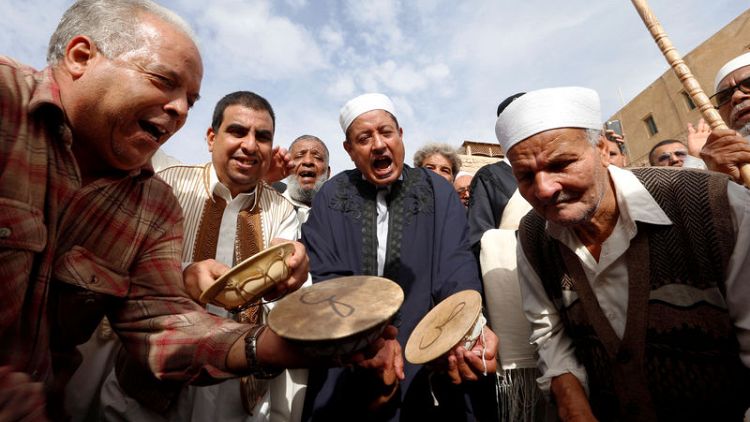By Ulf Laessing and Aidan Lewis
TRIPOLI (Reuters) - Hundreds of Libyan Sufis packed the narrow streets of Tripoli's walled old city to celebrate the Prophet Mohammad's birthday on Tuesday, chanting hymns to the beat of drums and cymbals.
Dressed in traditional robes, participants said it was the biggest turnout for the celebration of Mawlid in the Libyan capital for several years after poor security and fears of attack prevented previous large processions.
Mawlid is an important event for Sufis, whose spirituality is an integral part of North African Islam.
Sufism, a mystical strain among both Sunnis and Shi'ites, dates back to Islam's early days. Besides the standard prayers, Sufi devotions include singing hymns, chanting the names of God or dancing to heighten awareness of the divine.
"Many more people have joined this year. In the past two years few came after attacks from extremists," said Siddiq Abuhadena, an engineer.
Sufi worshippers said they were wary of a rise of Salafists and extremists in Libya opposing their traditions.
Tensions have grown in recent years between Sufis and Salafists, a group influenced by Saudi Wahhabis and other ultra-conservative foreign Islamists.
Salafists following a Saudi preacher, Rabi al-Madkhali, have gained ground in Libya since the 1990s.
Their social influence and military power has increased since a 2011 uprising that toppled former Libyan ruler Muammar Gaddafi, leading to widespread insecurity and intermittent armed conflict. Dozens of Sufi shrines have been destroyed or damaged.
Security in Tripoli has stabilized in the past two months following 10 days of heavy clashes.
After processing through the old city, marchers spilled out onto Martyrs Square, known under Gaddafi as Green Square, where the former leader used to address his supporters.
"There are some who want to ban the celebration of Prophet Mohammad. They say the Prophet Mohammad did not celebrate his birth. They are lying," said Abdullah Abubanun, head of a Zawiya, or Islamic school.
Dozens of Sufi shrines including mosques, tombs and libraries have been destroyed or damaged by hardliners since 2011 across Libya, Human Rights Watch said in a report a year ago.
(Editing by Alexandra Hudson)
